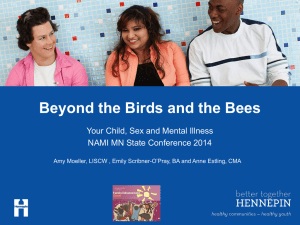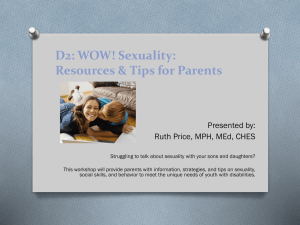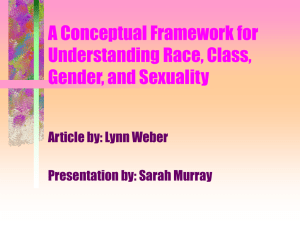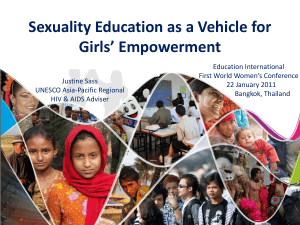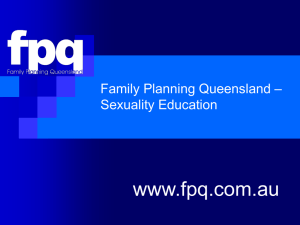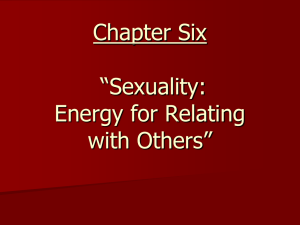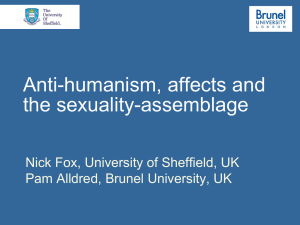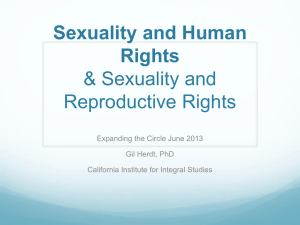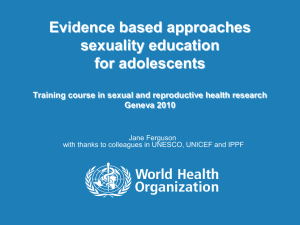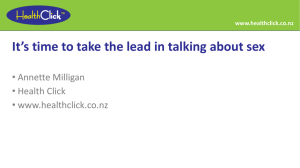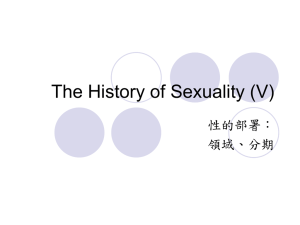PowerPoint Template Suggested Usages
advertisement
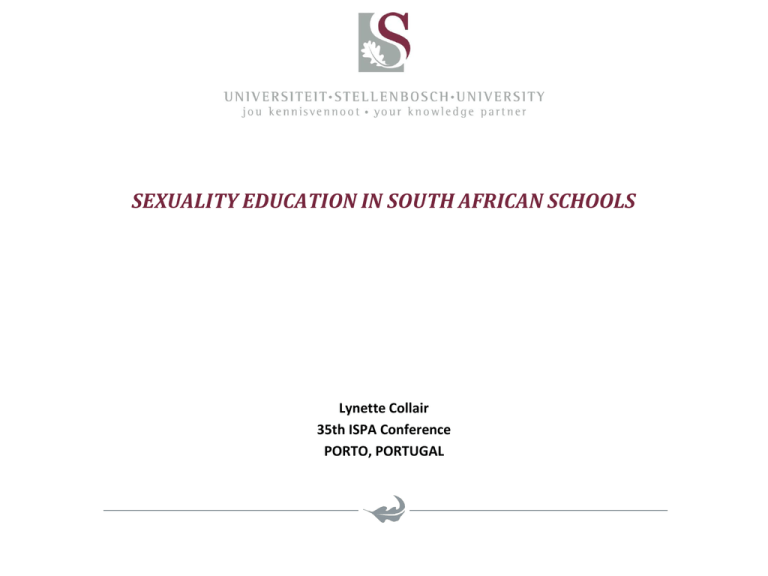
SEXUALITY EDUCATION IN SOUTH AFRICAN SCHOOLS Lynette Collair 35th ISPA Conference PORTO, PORTUGAL Introduction This paper reports on sexuality education in South African schools. It examines the rationale for a sexuality programme that is embedded in the Department of Education’s National Life Skills curriculum from grade 1 to grade 12, reports on aspects of the curriculum and concludes with some of strengths and challenges faced in the delivery of the curriculum. 2 About South Africa • • • • • • • • • 3 South Africa has a growing population of 52 982 000 people 10% are HIV positive Over 50% of South Africans live in poverty 15 330 997 children between 5 and 19 (29%) Multi-cultural Secular Strong human rights culture Teenage pregnancy problematic Prevalence of family violence Human beings are sexual beings The basic assumption that underlies the prime of place that sexuality education occupies in the national school curriculum, is that sexuality is a fundamental aspect of being human and that it has far reaching effects on the physical, social, emotional and spiritual aspects of both an individual as well as that of the community (Unesco, 2009). 4 What is sexuality Sexuality is a lifelong process that begins at birth and ends at death. Sexuality is more than about genitals and what we do with our genitals. Sexuality also describes how we think, act and feel about being male or female. It has to do with how we act in relationships, how we show love and affection. How we feel about or bodies, and who we are attracted to. (ReCapp. www.etr.org/recapp/practice/edskillsindex.htm in Vergnani and Frank 2005) 5 Rationale for sexuality education • The threat of HIV and Aids • Unsatisfactory incidence of teenage pregnancy • Family violence It is considered important that all South African school children should develop a positive view of their sexuality and sexual relationships and that through acquiring the necessary information and developing the accompanying skills and values, they would be able to make informed, healthy decisions about their sexuality. 6 • Best place for this is through the national education curriculum – compulsory until age 15. • In S.A. sexuality education forms part of the Life Skills curriculum from Grade R – 3 (5-8yrs)and Grade 4 – 6(9-11yrs) respectively) and part of the Life Orientation curriculum from Grades 7 to 12 ( 12 -18yrs) • Evident in several themes within Life Skills or Life Orientation 7 Sexuality education in the curriculum Life Skills - Grades R-3 (5-8years) • Beginning Knowledge • Creative Arts • Physical Education • Personal and Social Well-Being Life Skills Grades 4-6. • Creative arts • Physical Education • Personal and Social Well-being 8 Personal and Social Well-being Study area includes social healthy, emotional health, relationships with others and the environment. Values and attitudes are also important. Some aims: • • • • To teach learners how look after themselves Helps learners to make informed decisions , morally responsible and accountable decisions about their health and environment. Addresses issues relating to nutrition, diseases including HIV, safety, violence, abuse and environmental health. Learners to develop skills to relate positively and make a contribution to family, community and society while practising the values embedded in the Constitution. Taught to exercise their human rights, to respect the rights of others and to show tolerance towards diversity. Some content Gr R-3 • • • • • • 9 Me – who am I , what makes me special, unique – same different to friends, timeline My family – care , different family compositions Healthy living – eating, cleaning, sleep, exercise Feelings Keeping my body safe Rights and responsibilities – at home, school, community, in the environment Some content Grade 4-6 1. Development of Self – personal strengths, strengths of others 2. 2. Social Responsibility • • • • • • • 10 Respect for own and others bodies, privacy, bodily integrity – not subjecting to destructive practices such as substance abuse Positive self esteem Abilities interests and potential Self management Peer pressure Dealing with conflict Problem solving Emotions – coping with Working in groups at home, school Bullying how to protect against Rights and responsibilities Relationships with others Social responsibility – discrimination, stereotype and bias • Gender stereotyping • Effects of gender-based abuse Child abuse prevention Social responsibility – violence prevention Issues of age and gender in different cultural contexts Caring for people - Some content Gr 4-6 continued. 3. Health and environmental responsibility • • • • • • 11 Personal and household hygiene Food and water hygiene communicable diseases HIV basic explanation , transmission through blood and body fluids, how HIV is not transmitted, how to protect oneself against protection through blood; stigma, dealing with stigma, how to change attitudes to substance abuse Life Orientation 5 topics Grades 7-9 ( ages 12-14) • 1. development of the self in society • 2. health, social and environmental responsibility • 3. constitutional rights and responsibilities. • 4. physical education • 5. world of work 6 topics Grades 10-12 ( ages 15-18) • 1. development of the self in society • 2. social and environmental responsibility • 3. democracy and human rights • • • 12 4. careers and career choices 5. study skills 6. Physical education Some content Gr 7-9 (age 12-14) Development of self in society Self-concept relationship with self, family, friends, role of media, culture, religion, community Personal interests Respect for self and others Changes in boys and girls: puberty , gender constructs, physical and emotional changes Respect for self and others’ body changes Peer pressure Dealing with peer pressure Assertiveness, negotiation skills How peer pressure may influence an individual - substance abuse, unhealthy sexual behaviour where to find help Human rights 13 Sexuality • Understanding one’s own sexuality • Influence of friends and peers • Family and community norms • Social pressures including media • Problem-solving skills • Sexual behaviour and sexual health – risk factors leading to unhealthy sexual behaviour • Unwanted results • Strategies to deal with unhealthy sexual behaviour • Protective factors 14 Some content Gr 10 -12 (15-18yrs) • • • • • • • • • • 15 Changes towards adulthood Male and female reproductive roles Contraception, SSTI’s Gender differences Sexual decision making Relationships Gender roles and their effects on health and well-being Effect of gender inequality on relationships: Sexual abuse, teenage pregnancy, violence ,STIs, HIV Healthy lifestyle choices Values, respect for others …………………………………………………. HIV prevalence 15-24 year 16 Some challenges The human factor • Teachers come with their own attitudes, values and feelings about sexuality and who cannot separate this from their work. • • Cultural differences • • • “ I feel uncomfortable speaking about these things” Gender roles Polygamy Teacher training • More than 50% of the teaching corps is over 40. Many have not received adequate training in sexuality training. Poverty • complexity of the effects of poverty on school attendance, teenage pregnancy, acceptance of gender roles, abusive relationships ……………………………………… The drop out factor • 17 Learners most at risk leave the schooling system early References • Department of Basic Education. Republic of South Africa. 2011. National Curriculum Statement. Curriculum and Assessment Policy Statement. Pretoria.Government Printer. • Statistics South Africa, 2013. Midyear population estimates. Pretoria. • UNESCO. 2009. International Technical Guidance on Sexuality Education. Paris.Unesco. • Vergnani T. and Frank E. 2002. Sexuality Education for Intermediate Phase (Grades 46) Teachers. Sandton. Heineman Publishers. • Vergnani T.,Frank E. and Johns R. 2006. Sexuality Education for Senior Phase (Grades 7-9) Teachers. Sandton. Heineman Publishers. • 18 Contact details for further correspondence Lynette Collair Department of Educational Psychology Stellenbosch University Private Bag X1 Matieland lyncol@sun.ac.za • Contact information: • • • • 19 Lynette Collair Email: lyncol@sun.ac.za +27 21 8082304 +27 835562011
